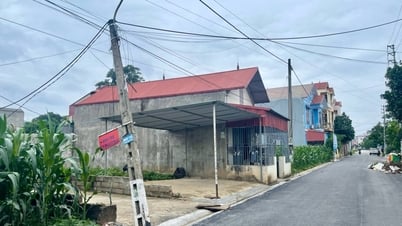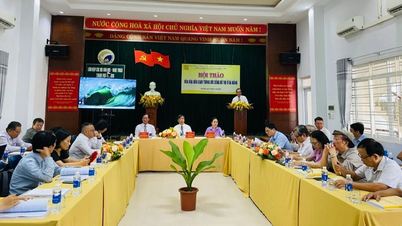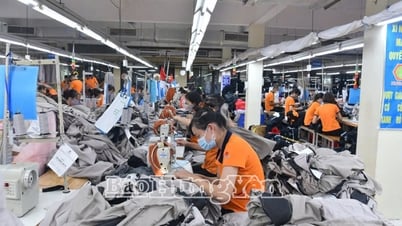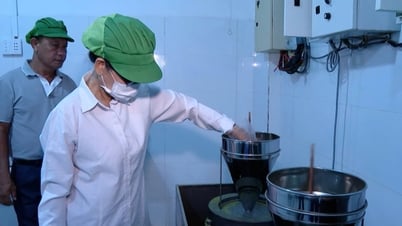The Ministry of Health proposes to require the application of the GMP system to health protection foods; apply HACCP or ISO 22000 or equivalent to: Medical nutritional foods for special medical purposes; nutritional products for children up to 36 months of age; and food supplements.
0:00 08/17/2024 09:39

The Ministry of Health is proposing to develop a revised Food Safety Law.
The Ministry of Health said that the mandatory application of quality management systems has been clearly stated in the Food Safety Law and Decree 15/2018/ND-CP. Clause 4, Article 4 of the Law on Food Safety stipulates the State's policy on food safety: Establishing a legal framework and organizing the implementation of a roadmap for mandatory application of Good Manufacturing Practices (GMP), Good Agricultural Practices (GAP), Good Hygiene Practices (GHP), Hazard Analysis and Critical Control Points (HACCP) and other advanced food safety management systems in the process of food production and trading. Article 28 of Decree 15/2018/ND-CP stipulates the application of GMP to health food production facilities.
Regarding the regulations on product quality management systems, according to the Ministry of Health, up to now, only Good Manufacturing Practices (GMP) are required to be applied to health food production facilities (Article 28 of Decree No. 15/2018/ND-CP). Some food product groups with high levels of food safety risks for users such as: Medical nutritional foods for special medical purposes, nutritional products for children up to 36 months old, supplementary foods (formula milk for infants, the elderly) ... are still only required to apply "Food safety assurance conditions" like most other common food product groups. Similar to food businesses, establishments importing the above high-risk food groups are currently "not eligible for a Certificate of food safety eligibility" (Point d, Clause 1, Article 12, Decree 15/2018/ND-CP). This regulation causes difficulties for post-inspection, especially traceability requirements for imported goods.
According to the Ministry of Health, the work of counting and reviewing establishments certified with GMP, ISO 22000, FSC, HACCP or equivalent is facing difficulties. On the other hand, there are no legal documents regulating the corresponding food safety management for establishments that have been granted a Certificate of Good Manufacturing Practice (GMP), Hazard Analysis and Critical Control Point (HACCP), ISO 22000 Food Safety Management System, International Food Standard (FS), Global Standard for Food Safety (BRC), Food Safety System Certification (FSSC 22000) or equivalent that are still valid.
The explosion of information technology, the need to use online services of people increases, so online food business is increasingly developing through social networking sites such as: zalo, facebook, this business is mostly small, unlicensed, many types of food are sold in a homemade style (produced, processed according to the requirements, orders of consumers), causing difficulties for management.
Ensure all food products are safe for consumers
With the goal of building and maintaining a system to ensure that all food products are safe for consumers and do not harm health; ensuring that the organization complies with legal regulations, national and international standards related to food safety, such as HACCP, ISO 22000... and specific regulations of each country, region and international, the Ministry of Health proposes the solution Mandatory application of GMP Quality Management System for health protection foods; application of HACCP or ISO 22000 or equivalent for: (i) Medical nutritional foods for special medical purposes; (ii) Nutritional products for children up to 36 months of age; (iii) Food supplements.
Other establishments must be granted a Food Safety Certificate issued by a competent authority.
The Ministry of Health said that when food safety regulations are effectively applied, the number of food poisoning and food-related illnesses will decrease. This will reduce the financial burden on the public health system, reducing the cost of disease treatment and health care.
A safe and stable environment in the food industry increases investor and business confidence. This can lead to increased investment in the food processing industry and expansion of production, thereby creating jobs and promoting economic growth.
Compliance with international food safety standards makes it easier for a country's food products to enter international markets. This can increase exports, improve the trade balance and generate additional income for the national economy.
Clear regulations and quality management systems help the State to manage food-related activities more effectively. This leads to more rational use of public resources and budgets, and improved productivity in inspection and supervision activities.
However, according to the Ministry of Health, to ensure consistency and fairness, when announcing the acceptance of a set of standards and regulations, competent authorities must evaluate the equivalence/conformity of this set of principles and standards compared to the corresponding Good Practice principles and standards of the World Health Organization, thus requiring funding and highly qualified human resources.
GMP compliance helps enhance business reputation
According to the Ministry of Health, GMP compliance helps enhance a business's reputation, creating trust among customers, partners and the market. GMP-certified products are often considered to be of high quality and reliable, thereby enhancing the business's brand.
Many countries and regions require imported products to comply with GMP standards. Therefore, applying GMP can help enterprises expand international markets, increase export capacity and global competitiveness.
However, businesses, especially small and medium-sized enterprises (SMEs), can find it difficult to meet food safety requirements and standards. The costs of investing in new processes, technology and staff training can be high, putting financial pressure on businesses and affecting their competitiveness.
In some cases, the implementation of strict food safety standards can increase the cost of products. This can lead to a negative reaction from domestic consumers, especially if prices become unaffordable for people's income levels.
Raising public awareness of food safety
For consumers, according to the Ministry of Health, food testing regulations promote public awareness of food safety. People are more aware of the importance of choosing safe food and tend to seek out products with quality inspections.
Consumers can get better value for their money, with products that have a longer shelf life and higher nutritional quality. Eating better quality food can lead to better health in the long term, reducing the risk of chronic diseases such as diabetes, obesity and heart disease.
However, products that meet high quality standards may become a luxury for a segment of low-income consumers. This may lead to consumption discrimination, where low-income consumers can only afford cheaper but lower quality products, causing inequality in access to safe food.
Controlling hazards from raw materials ensures consumer safety
According to the Ministry of Health, applying a quality management system helps businesses standardize production and service processes, thereby ensuring stable and consistent quality in all products or services.
In the food industry, applying QMS such as HACCP, ISO 22000 helps control hazards from raw materials, processing to final products, ensuring safety for consumers.
In addition, achieving international certifications, international QMS certifications such as ISO 9001, ISO 22000 help businesses easily access and expand markets, especially in markets with high requirements for quality and safety.
Source: https://baolangson.vn/de-xuat-ap-dung-cac-tieu-chuan-an-toan-thuc-pham-nghiem-ngat-hon-voi-sua-thuc-pham-bo-sung-5018703.html




![[Photo] Prime Minister Pham Minh Chinh meets the Vietnamese community in Malaysia](https://vphoto.vietnam.vn/thumb/1200x675/vietnam/resource/IMAGE/2025/5/25/1f11d1256d7745a2a22cc65781f53fdc)

![[Photo] Panorama of the memorial service for former President Tran Duc Luong](https://vphoto.vietnam.vn/thumb/1200x675/vietnam/resource/IMAGE/2025/5/25/d33968481f21434fa9ed0df48b9ecfa9)

























































































Comment (0)